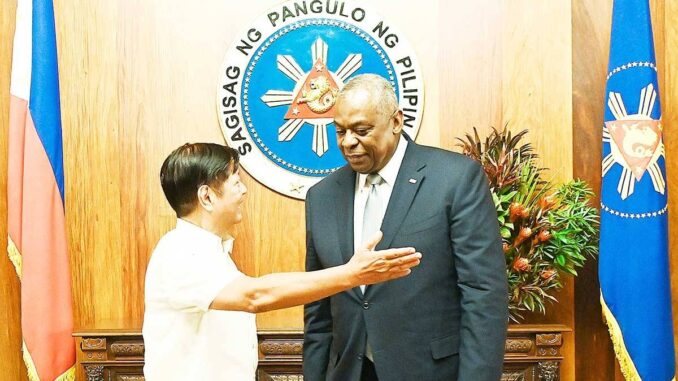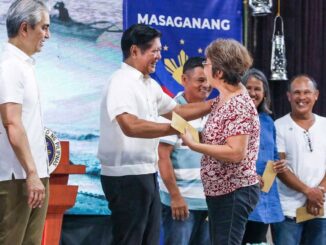
(UPDATE) PRESIDENT Ferdinand Marcos Jr. on Monday welcomed the additional $1 million in urgent humanitarian aid from the United States government for those affected by the recent typhoons as he met with visiting Secretary of Defense Lloyd Austin III in Malacañang.
Austin extended his “condolences, thoughts, and prayers to all those who’ve been disadvantaged by these six significant storms that have taken place in a very short period of time.”
PALACE GUEST President Ferdinand Marcos Jr. welcomes US Secretary of Defense Lloyd James Austin III at Malacañang on Nov. 18, 2024. PHOTO BY NOEL B. PABALATE/PPA POOL
“Mr. President, I have authorized US troops… to provide life-saving aid to the Filipino people. The US has also secured another million dollars in urgent humanitarian aid and that will enhance the work of the USAid (United States Agency for International Development) and the World Food Program,” Austin told Marcos.
Austin, who visited the country in July with US Secretary of State Anthony Blinken, lauded Marcos for his vision to use all nine Enhanced Defense Cooperation Agreement (EDCA) sites for disaster response.
“It was your vision a while back for these sites to be used to do exactly what you’ve described: prepositioning supplies, food and other elements, other personal elements in times of urgent need…. And that your vision has come true. So, we’re glad we’re a part of that,” he said.
In response, Marcos stated “how important the EDCA sites have become” in how the government rolled out rescue and relief efforts in the wake of calamities.
“The EDCA sites became staging areas because right after the storm, many areas can only be reached by helicopter. And many roads [were] closed because of landslides, and therefore, even the main capital of provinces can only be reached by aircraft,” the chief executive said.
Before his courtesy call in the Palace, Austin signed an agreement with Defense Secretary Gilberto Teodoro Jr. on the sharing of classified military information and technology as the allied nations seek to enhance further their cooperation to address China’s growing aggression in the region.
The General Security of Military Information Agreement (GSOMIA) was described by the Department of National Defense (DND) as “a critical step to enhance information sharing and deepen interoperability between the Philippines and the US.”
Marcos said the agreement was “a very important step in continued interoperability of our two militaries” amid “the different issues that are facing both our countries, especially on the economic front and certainly the military front.”
SHARING INFORMATION This handout photo taken and released on Nov. 18, 2024, by the Philippine Department of National Defense shows US Secretary of Defense Lloyd Austin (left) and Philippine Defense Secretary Gilberto Teodoro Jr. exchanging documents after signing the General Security of Military Information Agreement. HANDOUT PHOTO BY DND
Teodoro and Austin signed the information-sharing agreement in Camp Aguinaldo that calls for the establishment of a security command center where military and defense officials can decide how to respond to regional challenges.
“You’ve heard me say so many times, Mr. Secretary, we are more than allies. We are family, and it is indeed great to be here with you today and congratulations on this very promising facility,” Austin told Teodoro.
Teodoro thanked Austin for the continued assurances the US has made amid China’s incursions and dangerous maneuvers against Philippine vessels in the West Philippine Sea.
The groundbreaking of the facility, Armed Forces chief Gen. Romeo Brawner Jr. said, was a pivotal moment as the Philippines and the United States entered a new era of collaboration and partnership.
“Thus groundbreaking represents not only the construction of a facility, but the solidification of our commitment to one another, ensuring that our forces stand united in the face of challengers,” Brawner said.
The combined coordination center, Brawner said, “will be a vital nexus for joint operations, a gateway for information sharing and strategic coordination.”
“It will enhance our ability to collaborate during a crisis, fostering an environment where our strengths combine to safeguard peace and security in our region,” Brawner said.
Apart from security matters, the facility will elevate capabilities in humanitarian assistance, disaster response, and maritime security, ensuring swift and effective response as the need arises.
The Defense Department said Austin was due to visit Palawan on Tuesday for a meeting with Filipino forces responsible for patrolling the South China Sea and defending outposts.





Be the first to comment